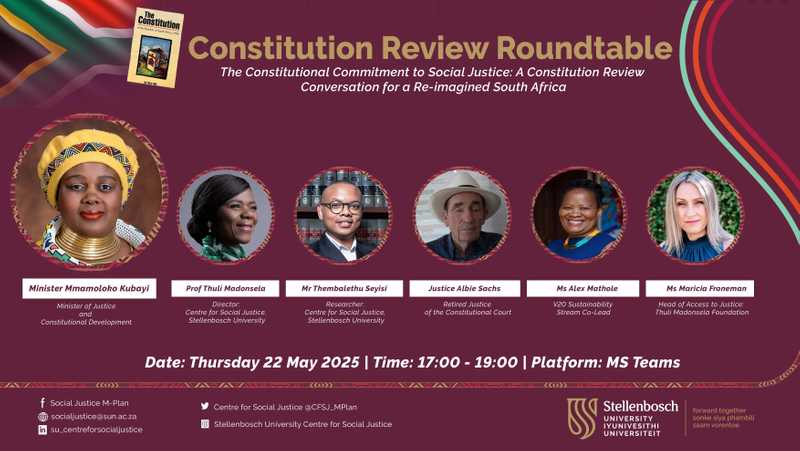Reimagining the Constitution for Social Justice
“This constitution is our own humble contribution to democracy and the culture of human rights world-wide; and it is our pledge to humanity that nothing will steer us from this cause.” These words, spoken by former President Nelson Mandela during the adoption of South Africa’s Constitution in 1996, resonate with the hope and ambition of a nation reborn from the ashes of apartheid. They capture the values of ubuntu and solidarity that promised to heal the wounds of apartheid. Yet, nearly three decades later, as we gathered at the Centre for Social Justice’ (CSJ) Constitution Review Roundtable on 22 May 2025, it became clear that the same Constitution - often hailed as one of the most progressive in the world- is not experienced in the same way by we the people.
The Roundtable, attended by luminaries such as Minister Mamoloko Kubayi, Professor Thuli Madonsela, and Justice Albie Sachs, was a sobering reflection on the gap between the constitutional vision and today’s reality. Prof Madonsela reminded us that the structural disparities of colonialism and apartheid still cast long shadows. Her recitation of a young woman’s poem echoed the frustration of a generation yearning for systemic change and a South Africa where equality is not just a constitutional promise but a lived experience.
President Mandela celebrated our Constitution as a symbol of unity and reconciliation, “written in the hearts of millions.” Yet, the Roundtable discussions revealed persistent divisions. Minister Kubayi highlighted progress in legislative measures for equitable access to land, water, education, and healthcare, but she also acknowledged ongoing challenges. The discussion on the non-implementation of Chapter 5 of the Promotion of Equality and Prevention of Unfair Discrimination Act stands as a stark reminder of the gap between aspiration and action. Both Prof Madonsela and Commissioner Prof Tshepo Madlingozi of the South African Human Rights Commission expressed deep concern that chapter 5 remains not implemented. Besides dictating the states duty to promote equality, section 27 of the Act also demands a social commitment by all persons to promote equality. It appears that the implementation, not just aspiration, remains our achilles’ heel.
Justice Albie Sachs offered a powerful reflection on the Constitution as a living document, one that has shaped landmark judicial decisions such as Grootboom and Mahlangu which were about advancing socio-economic rights and gender equality. His words underscored the judiciary’s pivotal role in breathing life into the Constitution’s transformative potential. However, the Roundtable underscored that access to justice remains limited, with under-resourced courts and little understanding of the courts system which barrier prevents many from claiming their constitutional guarantees.
Alex Mathole, Values 20 Advocacy Stream Lead, called for the explicit inclusion of social justice as a value in Chapter 1 of the Constitution resonated deeply with the participants. Mathole, who like us at the CSJ, understands social justice to be about promoting fairness, equity and justice including just and fair treatment and distribution of resources, argued that an explicit inclusion of social justice in the Constitution is crucial for sustainable development. Values shape behaviour and a successful Constitution is one that delivers for all people was her parting short.
Maricia Froneman from the Thuli Madonsela Foundation’s contribution on employment law brought another critical dimension to the fore. The exclusion of self-employed workers and independent contractors from the Constitution’s fair labor provisions highlights a significant blind spot that exacerbate social injustice. Extending legal protections to these workers is not merely a matter of policy but a question of justice that will ensure that all who work are afforded dignity and security.
In that speech referred to earlier, President Mandela praised the Constitution’s inclusive drafting process, driven by unprecedented public participation. As we prepare to submit our comments to Parliament in response to the call for written submissions on the annual review of the Constitution, the CSJ encourages as many people as possible to do the same for the deadline of 30 May 2025. The Constitution and the implementation thereof must reflect the challenges of the current society which might not necessarily be the same as that of nearly three decades ago. Public participation, as I emphasised in my closing remarks, is the lifeblood of this process. Every South African has a stake in reimagining a Constitution that serves all of us.
The work of reimagining the Constitution for a socially just society must not end at academic institutions —it must continue in our homes, communities and workplaces, driving us toward a South Africa where social justice is not just an ideal but a reality.
Thembalethu Seyisi is a Researcher at the Centre for Social Justice, Stellenbosch University.
